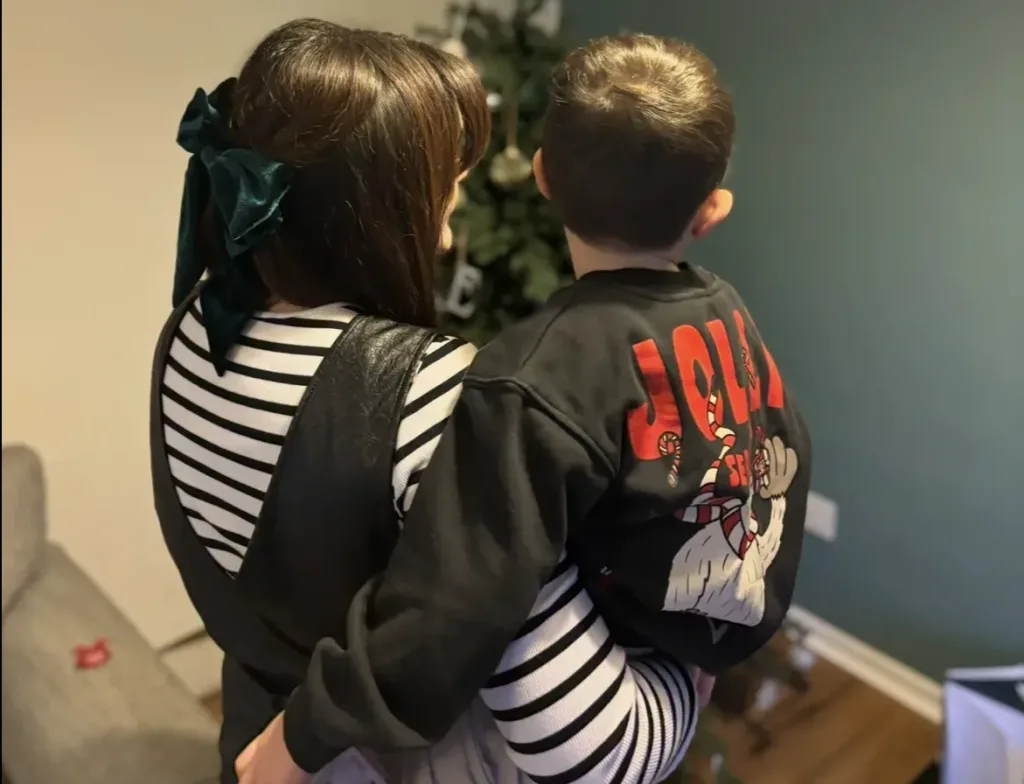As part of the last generation who grew up without on-demand social media and 24/7 internet, I was harrowingly reminded of how much the media shapes our minds after watching the powerful Netflix drama Adolescence. And as a mother of a young boy, it left a mark on me.

If you haven’t watched it, then ”Adolescence” is a miniseries that delves into the influence that media and people have on teenagers, as well as toxic masculinity. 13-year-old Jamie Miller is arrested for the alleged murder of his classmate, Katie Leonard and as the investigation unfolds, it reveals that Jamie endured relentless cyberbullying and was subjected to online harassment. The series highlights the dangerous and often misogynistic narratives that infiltrate the younger generation’s world, through social media and online influencers. It exposes how young men, sometimes without realising it, absorb toxic ideas about masculinity and women. And the real danger? This is not just fiction—it’s happening in real life.
The Influence of Problematic Public Figures
From Andrew Tate’s extreme views, to Russell Brand’s sexist ‘jokes’ to P Diddy’s portrayal of women, we’re seeing public figures who, rather than guiding young men towards self-awareness and respect, reinforce outdated and harmful ideologies. These figures promote power, dominance, and emotional suppression, often at the expense of women and vulnerability.
Then we have the media itself. Hands up – who remembers singing along to songs, having no idea of what the actual meaning was? Catchy songs that when you look at the lyrics, actually degrade and objectify women. And it’s not just male-driven content. Just take a look at Britney Spears ‘I’m a Slave 4 U’, implying that women are under the control of men, forming notions in both the male and female mind. Some people may think ‘they’re just lyrics’ and we need to take them with a ‘pinch of salt’, but how much are children consuming? Songs that are played at parties, on the radio, with sexist lyrics and misogynistic connotations:
- Robin Thicke – Blurred Lines – ‘I know you want it’, disregarding consent
- Kanye West – Gold Digger – playing into the stereotype that women only want men for money
- David Guetta – Sexy Chick – “I’m tryna find the words to describe this girl without being disrespectful” objectifying women
I even heard a song on the radio the other day with the lyrics “If you don’t want me, I’ll just deem you gay” from Sabrina Carpenter, echoing schoolyard bullying and reinforcing damaging ideas about masculinity and sexuality. What are these lyrics telling the younger generation – that it’s okay to bully and normal to objectify?
But, the real issue for me is social media: content that moms, dads, aunties, uncles, grandparents don’t even see because of their algorithms. An endless loop of ‘influential’ content that is sexist, forms gender bias, and creates a warped sense of masculinity over kindness, emotional intelligence, and respect. This was highlighted in Adolescence, with Jamie Miller part of a seemingly ‘normal’ upbringing but his mind was influenced to think that rejection was a basis to harm someone, that what he did was justified, because of the way he had been influenced by social media.
The Role of Parents: Shaping a New Narrative
As a parent of a young boy, this issue hit me. While he may still be too young for social media, video games, or explicit music lyrics, I already see how the world around him could be shaping his understanding of masculinity.
Children are absorbing more than we think—from the way their friends with older siblings talk, to the cartoons they watch, to even seemingly harmless phrases still present in books and programmes like ‘postman’ or ‘fireman’, reinforcing outdated gender roles.
It’s those small moments too, when children may be told to ‘stop crying’ or ‘you’re being too sensitive’ to the extreme ‘man up’; phrases that can still be heard in schools and workplaces. Instead of being encouraged to express their emotions and shown how to deal with them, without realising it, we’re teaching children, especially young boys, to suppress vulnerability from an early age.
Just as the creators of Adolescence emphasise, it’s on us—as parents, guardians, role models, just people —to break this cycle. We need to have open conversations with the younger generation, to praise them when they express their emotions, and to challenge the harmful messaging they encounter. Because they will no doubt encounter it.

The Need for Better Role Models
But we can only do so much. With social media being so prominent in people’s lives, we need to be more aware of who the younger generation are tuning in to. It’s obvious that what we, and children need, are public figures who demonstrate a balanced and healthy version of masculinity—men who embrace vulnerability, resilience, and kindness. And what women need are for better male allies.
Look at Zayn Malik, former member of One Direction, who is very open about his struggles with anxiety, which is a relevant yet maybe still taboo subject amongst men.
Jordan Stephens, one half of RizzleKicks, who is a mental health campaigner and again is very open about his previous perceptions of women and how his upbringing had an impact on his behaviour.
Dwayne Johnson, wrestler and actor, who’s look is stereotyped as being ‘manly’, is very vocal with his depression struggles and can often be seen as an ally to women.
And more recently, Jamie Laing. The Radio 1 Presenter, recently ran five ultra-marathons in five days, openly discussing his mental and physical struggles throughout. He showed vulnerability, he cried, he talked about wanting to quit—but he didn’t. That’s the kind of role model young boys need: someone who is open about their struggles, someone who embodies perseverance without toxic bravado.
How This Translates to the Workplace
This issue isn’t confined to childhood—it follows boys into adulthood and ultimately shapes our individual behaviours and organisational culture. When young men are repeatedly told to “man up” and suppress their emotions they grow up believing that emotions are a weakness, that dominance is a measure of success, and that vulnerability is something to be hidden and it therefore creates toxic work environments. The habit of suppressing emotions becomes an ingrained habit, that define leadership styles and workplace dynamics. We see it in the gender pay gap, in the way women are talked over in meetings, in the unspoken pressure for men to never admit when they’re struggling.
Let’s look at some high-profile people in the world of business, many who are famed for their power and control. Elon Musk and Donald Trump for example are respected by some for their relentless work ethic, their strong and assertive views, their disregard towards groups of people, and their overall dominance but their leadership styles have been criticised for building a high-pressure, burnout-driven environment where people are not valued.
On the other hand, there’s Gareth Southgate who recently said young men ‘need better role models beyond online influencers.’ Contrastingly, his leadership style proves there’s no need for aggression and arrogance, with his empathetic and supportive nature making him a respected and effective leader.
Or, Satya Nadella, the CEO of Microsoft has been praised for his people-first, transformative leadership style, creating a culture of collaboration and emotional intelligence within the company. Leaders like Southgate and Nadella prove that success isn’t about ruthlessness, it’s about vision, consideration an the ability to collaborate and inspire others.
As parents, guardians, educators, colleagues, managers and leaders, we need to be conscious of the messages we endorse and we ultimately need to encourage emotional intelligence, respect, and inclusivity. If we want happier, healthier workplaces, we need to challenge outdated norms that reward aggression over collaboration and that dismiss empathy as weakness.
Conclusion
One of the main reflections after watching Adolescence was that we have to speak up more and provide the safe space so that others speak too. Whether that be in daily interactions with a toddler, check-ins with a teenager or as one-to-ones with line managers in the workplace, every conversation is an opportunity to shift the narrative.
We have to challenge the narratives that dismiss emotional expression, that devalue women, and that reward toxic behaviours. Change starts with the individual – at home, school, and at work. There must be environments where it’s okay to express emotions, where vulnerability is seen as strength, and where treating women as equals isn’t just expected, but ingrained in everyday life.